 “Every now and then in history, the human race takes a collective step forward in its evolution. Such a time is upon us now.”
“Every now and then in history, the human race takes a collective step forward in its evolution. Such a time is upon us now.”
—Renowned water/environmental activist (and Global Exchange ally) Maude Barlow
As we ring in 2012, let the revolution begin! From Tunisia to New York, from Spain and Greece to Oakland and ‘Occupies’ everywhere, people have taken to the streets to reclaim what is rightfully ours.
We the 99% seek more than the illusion of democracy… we want government in the hands of the people, not the corporations. We want just, fair, sustainable policies that benefit the majority — not only the wealthy few.
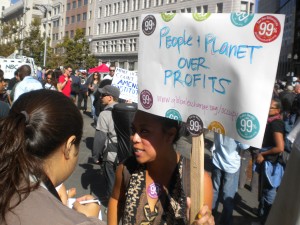
Global Exchange's Zarah Patriana speaking out in 2011
We will no longer stand by and allow banks, oil companies or our political system to place corporate interests above our shared values of justice, equality, good jobs and vibrant, resilient communities and ecosystems. We’re speaking out everywhere to deliver the message: Enough is Enough!
People across the world are saying enough is enough with the global economic and environmental crisis, and we are responding with a massive outpouring of activism and energy. Together we are changing the rules and creating a world that champions people power not corporate power, builds positive alternatives and promotes human rights, peace and democracy.
When a magazine like TIME names ‘Protesters’ the Person of the Year, it’s clear that our movement has truly captured the zeitgeist.
We are so inspired by the growing movement and the millions who have stood up against oppression, corporate exploitation, and environmental ruin. We, the 99%, are changing the rules!
Along with other Occupy activists, Global Exchange is speaking out in DC, New York, San Francisco and Oakland. We’re holding organizing workshops, taking critical next steps to stop the tar sands Keystone XL pipeline, organizing to oppose big banks and corporate greed, mobilizing our members to join us in taking a stand for system change and using all the tools of social media to reach thousands.
We are in the midst of revolution to end inequality. We are making history. The rule by the greedy few is collapsing. We know it.
This is what revolution for building positive alternatives looks like…
 Rebuilding local green economies and sustainable, just communities!
Rebuilding local green economies and sustainable, just communities!
Detroit is Ground Zero for the impact of casino capitalism. Shuttered buildings and vacant lots, unemployment and struggling schools are a grim testament to the power of an economic system that destroys entire communities to benefit the 1%.
In Detroit, we aren’t just Occupying — we are hard at work building the revolution.
Our Green Economy Leadership Training program helps rebuild the blighted Detroit community of Highland Park, neighborhood by neighborhood. We are working with local youth and residents to grow sustainable food, use clean renewable energy and create green jobs.
We’re not just theorizing. We’re digging, hauling, hammering and sweating — turning the ideas of local green economies into reality. Together we are demonstrating what economies and communities designed for the 99% look like.
This is what revolution for government by the people, not corporations looks like…
Transforming our laws to protect the rights of our communities — not corporations. 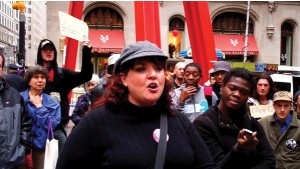
Current laws leave our communities at the mercy of corporate greed. Our communities are the battleground for the policies of corporate profit, from mass pollution, to the mortgage bailout, GMOs, fracking and more.
We are not just occupying public spaces, but working to occupy our local government and change laws to put communities — not corporations — in charge.
When the law denies rights of people and nature, we can and must change the law.
Our Community Rights Program is organizing in California, across the country and around the world to pass revolutionary laws that strip corporate protections and assert the right of communities to themselves decide what happens where they live, and at the same time to recognize the Rights of Nature.
This is what revolution for oil independence looks like…
Stopping the Keystone XL Pipeline Project!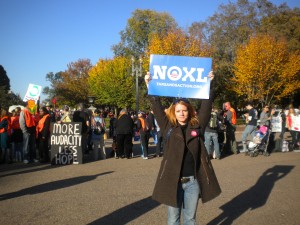
The proposed Keystone XL Pipeline, which would transport oil from the tar sands in Canada to the United States, is the largest and most disastrous industrial project in human history. And although our determined activism to stop Keystone recently led to a delay in the decision to build it, we’re not out of the woods!
The Pipeline will not only put our communities and ecosystems from the Canadian border to the Gulf of Mexico at risk, it will expand the production of tar sands oil, and in the words of renowned climate scientist James Hansen, it will be “game over for life and the planet.”
Across the country we ‘occupied’ President Obama’s fundraisers, campaign offices and rallies — calling on the President to reject the Keystone XL Pipeline project.
We activated our networks across North America to join the movement to stop the pipeline, through protests, actions, rights-based organizing and letter writing campaigns.
Obama has temporarily heeded our call, and the State Department is once again reviewing its plans — this time without the input of a company closely allied to tar sands interests. But if this catastrophic project is reborn, we will again go state-by-state and work with local indigenous communities, ranchers and community members to shut Keystone down.
This is what revolution for Human Rights looks like…
 Standing in solidarity with Mexico’s growing peace movement!
Standing in solidarity with Mexico’s growing peace movement!
There is a growing citizens’ movement for peace and justice in Mexico. While they don’t term the movement “Occupy,” our brothers and sisters across the border are rising up to save their very lives. They are working to change a system that has left over 60,000 Mexicans dead.
We must stand with them. Global Exchange has joined with Mexican civil society to call for an end to the bloodshed and the policies that continue this brutal violence.
We are organizing our allies on both sides of the border to curb the flow of arms into Mexico, to address drug prohibition and to call attention to and ultimately end U.S. military support for Mexican drug interdiction forces.
We are the 99%. We are the revolution.
We are changing the rules and our future! We cannot let up. Together we can change the rules to build a world that respects human rights, protects the planet and practices true democracy — a world that is not governed for and by the 1%, but democratically led by us all. But we can’t do it without you and we look forward to working together in 2012.
Consider making a special gift and supporting the work of Global Exchange. Please give what you can today. Together let’s build a movement the 1% can’t shut down.






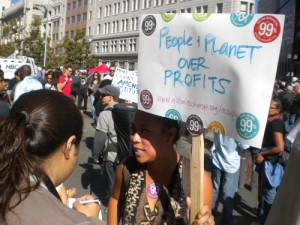




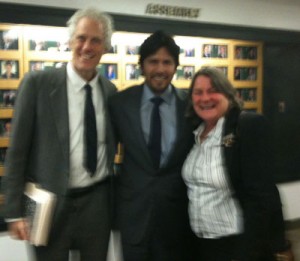
 I had the privilege of starting out the year witnessing, firsthand, the unfolding of the Egyptian revolution in Tahrir Square. I saw people who had been muzzled their entire lives, especially women, suddenly discovering their collective voice. Singing, chanting, demanding, creating. And that became the hallmark of entire year–people the world over becoming empowered and emboldened simply by watching each other. Courage, we learned in 2011, is contagious!
I had the privilege of starting out the year witnessing, firsthand, the unfolding of the Egyptian revolution in Tahrir Square. I saw people who had been muzzled their entire lives, especially women, suddenly discovering their collective voice. Singing, chanting, demanding, creating. And that became the hallmark of entire year–people the world over becoming empowered and emboldened simply by watching each other. Courage, we learned in 2011, is contagious!










